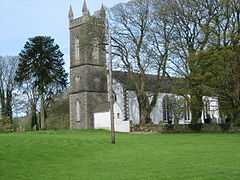Rosslea
| Roslea | |
| Irish: Ros Liath | |
 Roslea parish church |
|
 Roslea | |
| Population | 554 (2001 Census) |
|---|---|
| District | Fermanagh |
| County | County Fermanagh |
| Country | Northern Ireland |
| Sovereign state | United Kingdom |
| Postcode district | BT |
| Dialling code | 028 |
| EU Parliament | Northern Ireland |
| UK Parliament | Fermanagh and South Tyrone |
| NI Assembly | Fermanagh and South Tyrone |
| |
Rosslea or Roslea (from Irish: Ros Liath, meaning "grey wood") is a small village in County Fermanagh, Northern Ireland, near the border with County Monaghan in the Republic of Ireland. It stands on the River Finn and is beset by small natural lakes. Roslea Forest is nearby. In the 2001 Census it had a population of 554 people.
Former US President Bill Clinton has claimed that his distant forebears came from Roslea, though these claims have been dismissed by the Directory of Irish Genealogy as "baseless".
History
On 22 March 1921, during the Irish War of Independence, the Irish Republican Army (IRA) launched attacks on the homes of Ulster Special Constabulary (USC) officers in the Roslea area. Three USC officers were killed. When news of these killings reached Belfast, gunfire broke out in the York Street area and a Catholic civilian was killed.[1]
The Troubles
For more information see The Troubles in Rosslea, which includes a list of incidents in Roslea during the Troubles resulting in two or more fatalities.
2001 Census
Roslea is classified as a small village or hamlet by the NI Statistics and Research Agency (NISRA) (i.e. with population between 500 and 1,000 people). On Census day (29 April 2001) there were 554 people living in Roslea. Of these:
- 25.0% were aged under 16 years and 16.8% were aged 60 and over
- 46.8% of the population were male and 53.3% were female
- 97.5% were from a Catholic background and 2.0% were from a Protestant background
- 10.6% of people aged 16-74 were unemployed
For more details see: NI Neighbourhood Information Service
Education
St Terny's Primary School
References
| ||||||||||||||||||||